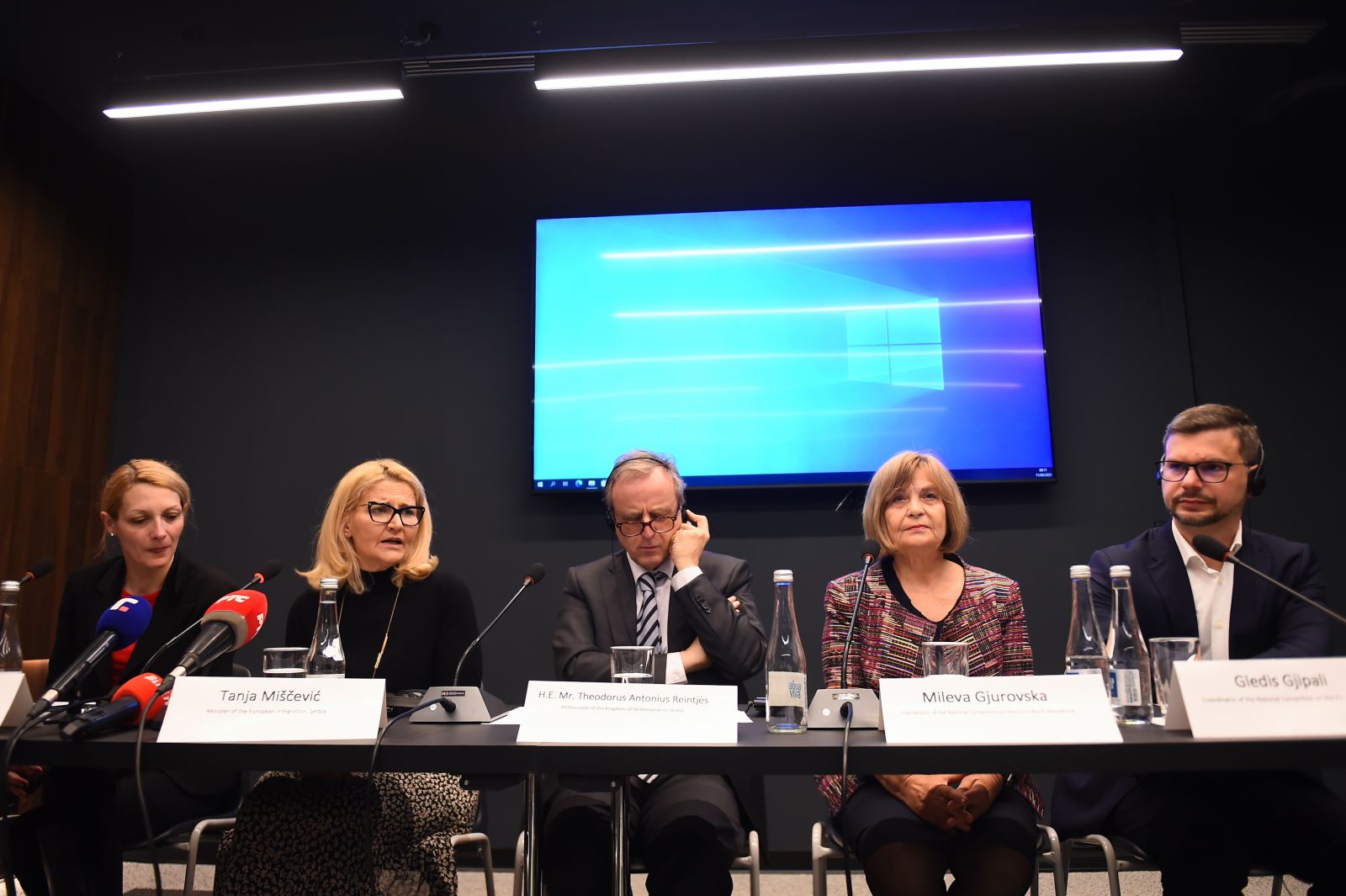
Minister of European Integration Tanja Miščević opened today the regional expert meeting “Let Justice Rule the Region” and on that occasion stated that civil societies were a balance and a promoter of reforms, which drew the state’s attention to new developments, while on the other hand, the state was trying to fulfil what was realistically achievable.
In addition to Miščević, at the opening of the two-day panel organised by the National Convention on the European Union in Serbia, Coordinator of the National Convention on the European Union in Serbia Bojana Selaković, Ambassador of the Kingdom of the Netherlands in Serbia Theodorus Antonius Reintjes, Coordinator of the National Convention on the European Union in North Macedonia Mileva Gjurovska and Coordinator of the National Convention on the European Union in Albania Gledis Gjipali also spoke.
“Conventions in the region exist and they were created as a suggestion that became very present at a certain moment. I remind you, the National Convention is a model that we took from what is known as Slovakia’s experience in the negotiation process”, Miščević said.
She added that unlike Slovakia, which had created its convention in the last phase of negotiations, it had been formed much earlier in Serbia.
“Even in the era of the associated country status, that is, in the era when we only had the obligation to implement the Stabilisation and Association Agreement, which proved to be a very useful instrument in monitoring the negotiations”, Miščević said.
She pointed out that from the very beginning, the role of the Convention had been defined as a basic platform, counting more than 800 organisations at the time.
“When we say 800 organisations, we do not mean only non-governmental organisations. We are referring to very significant parts of civil society in Serbia. From the Serbian Academy of Sciences, the Chamber of Commerce, faculties and institutes, to local non-governmental organisations”, Miščević said.
She pointed out that the role of the National Convention in Serbia was defined by the decision of the Assembly, which implied that all documents proposed by the Government and which represent negotiation documents must be controlled and reviewed by representatives of the appropriate working group of the convention.
“What did we learn from that first participation in joint work? We learned that partnership in the process is never that simple and is always a two-way street. Therefore, the openness of both sides should be implied, but very often this does not happen”, stated Miščević.
She pointed out that the state talked with civil society about key issues, such as judicial reforms, the fight against corruption, protection of rights, freedom and security, the fight against organised crime, terrorism, and also about migration – both legal and illegal migration.
“We have started to learn from our colleagues how to negotiate a Stabilisation and Association Agreement, because North Macedonia did it before anyone from the Western Balkans, and then it was time to give back, so in the last few years, we have been passing on our experience from the negotiation process”, Miščević said.
She emphasised that North Macedonia and Albania were the first countries to start negotiations, in accordance with the new methodology from the very beginning, and that Serbia could learn about the application of the new methodology based on their experience.
“On the other hand, we can help to convey the good and bad experiences of the previous work in the negotiations process between the Convention and the Government, how the preparation of documents is proceeding and how it is presented in Brussels as well as what we ourselves are trying to learn”, said Miščević.
Coordinator of the National Convention on the European Union in Serbia Bojana Selaković said that during the panel, topics related to the rule of law, Chapters 23 and 24 from the European integration framework would be most discussed.
“I believe that there is no need to emphasise how important these topics are in the European integration process for citizens of all countries participating in the negotiation process”, Selaković said.
She added that practically since its establishment, the National Convention in Serbia has shown its greatest activity precisely in the areas related to Chapters 23 and 24.
“Working groups that deal with these topics on a weekly basis had different types of activities, events, and communication with line ministries and made a truly immeasurable contribution, starting with the development of action plans for these two chapters, and ending with the reform of the judiciary, the adoption of essential reform laws concerning security, human rights and the judiciary in general”, Selaković said.
Coordinator of the National Convention on the European Union in Albania Gledis Gjipali pointed out that the regional meeting “Let Justice Rule the Region” was not the first in which the countries of the Western Balkan region participated and cooperated.
“We know that cooperation and good-neighbourly relations are very important for a successful accession process”, said Gjipali.
He stated that the countries of the Western Balkans have been in the process of accession negotiations with the EU for a very long time and that it is not a process that ends with accession, which can be seen in the examples of the countries that have joined the EU, and that it is a long-term transformation of society.
He emphasised that it is very important for society to support the EU accession process, but also that it is important to inform citizens about the reforms as they are often complicated and contain a lot of technical matters, incomprehensible to the general public, while the role of civil society and the convention is to clarify them.
Source: Tanjug









